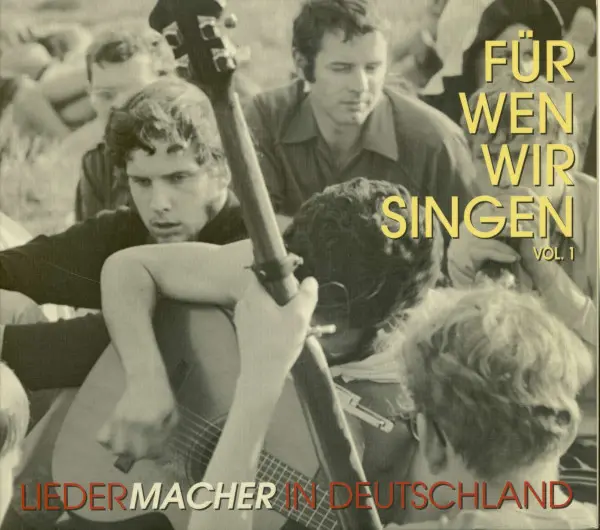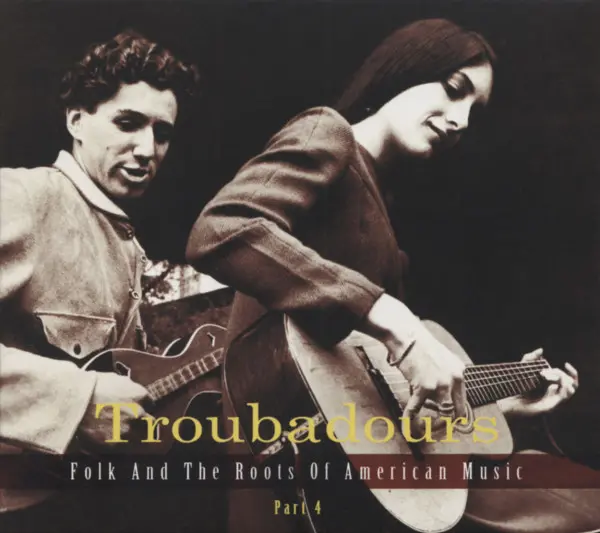Various - Liedermacher in Deutschland Für wen wir singen - Liedermacher, Vol.3 (3-CD)

- catalog number:BCD16907
- weight in Kg 0.27
- PDF (deutsch) Download
Various - Liedermacher in Deutschland: Für wen wir singen - Liedermacher, Vol.3 (3-CD)
Article properties:Various - Liedermacher in Deutschland: Für wen wir singen - Liedermacher, Vol.3 (3-CD)
Interpret: Various - Liedermacher in Deutschland
Album titlle: Für wen wir singen - Liedermacher, Vol.3 (3-CD)
Genre Schlager und Volksmusik
Label Bear Family Records
- Preiscode CP
- Edition 2 Deluxe Edition
Artikelart CD
EAN: 4000127169075
- weight in Kg 0.27
| Various - Liedermacher in Deutschland - Für wen wir singen - Liedermacher, Vol.3 (3-CD) CD 1 | ||||
|---|---|---|---|---|
| 01 | Mien Gott, he kann keen Plattdüütsch... | KIESEWETTER, KNUT | ||
| 02 | Herrn Pastor sein Koh | KAY, FIEDE | ||
| 03 | De Buer un de Knech | KAY, FIEDE | ||
| 04 | Min Jehann | WADER, HANNES | ||
| 05 | De Vullmachts Öllste | MOIN | ||
| 06 | Danz op de Deel | GODEWIND | ||
| 07 | Zirkus Holstein | LIEDERJAN | ||
| 08 | Griep na den Wind | DEBUS, HELMUT | ||
| 09 | Pidder Lüng | LORBASS | ||
| 10 | Promenade | DRAGSETH DUO | ||
| 11 | Dat muss doch auch wat Späßken bringen | BAIER & WESTRUPP | ||
| 12 | Morje, morje | BLÄCK FÖÖSS | ||
| 13 | Irjendwo dovöre, wo de Stroß ophöt... | BRINGS, ROLLY | ||
| 14 | Dä Januarmann | GALL, GÜNTER | ||
| 15 | Vorm Door Steher Räg | KOLBE, BODO | ||
| 16 | Lothringen | POHLMANN, MANFRED | ||
| 17 | Bad'wanna Blues | KRIWANEK, WOLLE | ||
| 18 | Hao lang braucht zom komma | FELDER, THOMAS | ||
| 19 | Falschheit | LINNENZWORCH | ||
| 20 | Moschd aus em Kruag | GOISSAHANNES | ||
| 21 | Grüß Gott, mein Bayernland | BIERMÖSL BLOSN | ||
| 22 | Was braucht man auf dem Bauerndorf | BIERMÖSL BLOSN | ||
| 23 | Gott mit Dir, Du Land der BayWa | BIERMÖSL BLOSN | ||
| Various - Liedermacher in Deutschland - Für wen wir singen - Liedermacher, Vol.3 (3-CD) CD 2 | ||||
|---|---|---|---|---|
| 01 | Maria | DEMMLER, KURT | ||
| 02 | Irgendeiner ist immer dabei | DEMMLER, KURT | ||
| 03 | Reiß mich ein | SCHICHT, Songgruppe der TU Dresden | ||
| 04 | Zugvögel | SCHICHT, Songgruppe der TU Dresden | ||
| 05 | Der alte Schulhof | PROTZE, WOLFGANG | ||
| 06 | Demokratietango | BRIGADE FEUERSTEIN | ||
| 07 | Sängerkrieg | ANDERT, REINHOLD | ||
| 08 | Mein Trabbi | ANDERT, REINHOLD | ||
| 09 | Der deutsche Philister | FOLKLÄNDER | ||
| 10 | So was placiert | MTS | ||
| 11 | Unterwegs | SCHÖNE, GERHARD | ||
| 12 | Kinderland | SCHÖNE, GERHARD | ||
| 13 | Meine Zeit | KARLS ENKEL | ||
| 14 | Aber fliegen | SCHMIDT, ARNO | ||
| 15 | Paul | BISCHOFF, NORBERT | ||
| 16 | Komm, Schwester | NOWAK, MAIKE | ||
| 17 | Als ich 14 war | THALHEIM, BARBARA | ||
| 18 | Trotzdem-Lied | THALHEIM, BARBARA | ||
| 19 | Zwischen Liebe und Zorn | KLAUS RENFT COMBO | ||
| 20 | Überholen ohne einzuholen | PANNACH, GERULF | ||
| 21 | Fluche Seele fluche | PANNACH, GERULF | ||
| 22 | Kinder | WEGNER, BETTINA | ||
| 23 | Von Deutschland nach Deutschland | WEGNER, BETTINA | ||
| Various - Liedermacher in Deutschland - Für wen wir singen - Liedermacher, Vol.3 (3-CD) CD 3 | ||||
|---|---|---|---|---|
| 01 | Heite kann i, heite derf i | MARON, SIGI | ||
| 02 | Wann du net aus Kagran warst | LIEBE, REINHARD & SEINE LEUTE | ||
| 03 | S'Lebn is hoat in Favorit'n | NUSSBÖCK, FRITZ | ||
| 04 | Einmal | MILESTONES | ||
| 05 | Frau, lauf weg | PLUHAR, ERIKA | ||
| 06 | Komm großer schwarzer Vogel | HIRSCH, LUDWIG | ||
| 07 | I wü' di g'spian | WERGER, STEFANIE | ||
| 08 | Pfui Teufel, mir graust | BILIK, FRANZ & SEINE BROGRESSIVSCHRAMMELN | ||
| 09 | Mein Gewissen erlaubt mir nicht... | PIRCHNER, WERNER | ||
| 10 | Ollas gaunz aundas | DEMMLER, KURT | ||
| 11 | Aber du bist mei Kittlfaltn | NEUWIRTH, ROLAND & EXTREMSCHRAMMELN | ||
| 12 | Minderheit | AMBROS, WOLFGANG | ||
| 13 | Sein Köpferl in Sand | BRAUER, ARIK | ||
| 14 | Tango der Macht | SCHMETTERLINGE | ||
| 15 | Anarchistenwalzer | WORRIED MEN SKIFFLE GROUP | ||
| 16 | Psychoterror | DRAHDIWABERL | ||
| 17 | Der Ausländer | KREISLER, GEORG | ||
| 18 | Waaßt Du, wo Auschwitz liegt | WAGNER, PETER | ||
| 19 | Der alte Wessely (gewidmet 140.000 Österreich | DANZER, GEORG | ||
| 20 | Donaukanal-Walzer | WEIHS, RICHARD | ||
Für wen wir singen
Who we sing for
Singer-songwriters in Germany
The song, especially the political song, has often been declared dead in Germany. But just a look at the monthly list of best songs - a hit parade of a special kind - shows how colourful and lively the scene of musicians singing'German' is in this country: Songs with critical, thought-provoking lyrics and music that is not necessarily based on established listening habits. This can go into many styles: classical chanson, folk, pop, blues, rock, jazz or rap. They all have a long tradition that can be traced back to the troubadours in the Middle Ages.
The collection'Für wen ich singe - Liedermacher in Deutschland' does not go that far back in time, however. The project, which is based on four 3-CD sets, offers for the first time an overview of the recent history of songwriters in Germany-West and Germany-East from the early sixties to the eighties of the last century. The first 3-CD set is about rediscovering tradition, about bank songs, utility poetry and current songs as well as German folk and new folk singers in the old Federal Republic. Hein & Oss Kröher and Peter Rohland had been striving for the democratic song long before the new folk song movement, among others in the Bündische Jugend. Among the voices who sought their own forms of expression against the background of their role models in France or the USA in the early sixties were many well-known names such as Franz Josef Degenhardt, Reinhard Mey, Walter Mossmann, Christof Stählin, Dieter Süverkrüp and Hannes Wader.
Between 1964 and 1969, the festivals at Burg Waldeck formed an important forum for her and many other performers, including Kristin Bauer-Horn, Walter Hedemann, Schobert & Black and Eva Vargas.
The German Folkrevival was started in the early to mid-seventies with Tom Kannmacher, Fiedel Michel, Elster Silberflug, Liederjan and Zupfgeigenhansel, among others. They did not want to cultivate the folk song as a museum tradition, but rather to create a new democratic type of song. Ougenweide brought a new musical colour to the spectrum of new German folk singers by mixing pop and rock musical instruments with old instruments such as the crumhorn and hurdy-gurdy. Achim Reichel was one of the first rock musicians to set classical German poets to music.
The themes of the other sets are the songs of the politically turbulent times of the seventies. They comment on emergency laws, professional bans, unemployment, Vietnam War, nuclear armament and nuclear power plants. In addition to many artists from the Waldeck era, new names have established themselves directly in daily political life - among them Dietrich Kittner, the song cabaret Floh de Cologne, Ekkes Frank or Lerryn alias Dieter Dehm. The folkrevival also brought with it a broad occupation with dialects. Many songwriters rediscovered the dialects of their home region as a buried tradition. So in Bavaria the Biermösl Blosn. In Stuttgart, Wolle Kriwanek sang the Swabian blues. In the Lower Rhine region Günter Gall earned his living in various formations (Mulwerk, Fukkepott, Düvelskermes) for language and song care, in the Flat German region Hannes Wader and Helmut Debus and in the'Kohlenpott' Frank Baier. Not to forget the other names that shaped the scene between the mid-1970s and early 1980s, such as Bernies Autobahn Band, Ina Deter, Joana and Konstantin Wecker.
Then there are songs and chanson in the GDR - taken seriously and promoted, but suspected as critical songs and suppressed as oppositional ones. Artists like Hanns Eisler, Ernst Busch and Gisela May continued the tradition of political song and chanson from the 1920s and 1930s. Wolf Biermann followed this up in the early sixties, became a critic of bureaucratic socialism and was banned from appearing and publishing. At the same time, so-called Hootenanny clubs were founded in which Perry Friedman, Hartmut König, Bettina Wegner and others performed. Under increased state influence, the FDJ singing movement developed from this with at times 4,000 clubs, including the Oktoberklub and the Songgruppe of the TU Dresden. In the mid-seventies, song theatres such as Karl's grandson and Schicht and folklore groups such as Folkländer and Wacholder were created in contrast to the singing clubs. In the 1980s Gerhard Gundermann, Stephan Krawczyk, Hans-Eckardt Wenzel and other songwriters articulated the difference between proclaimed ideology and reality and thus contributed to the critical discourse in the GDR.
Liedermacher in Deutschland - CD-Album Serie von Bear Family Records
Read more at: https://www.bear-family.de/bear-family/deutsche-serien/liedermacher-in-deutschland/
Copyright © Bear Family Records
Spitzenklasse !!!!!
Eine ausgezeichnete Zusammenstellung mit einige Entdeckungen für mich . Superklasse !!!!!!!!!!!

Ready to ship today, delivery time** appr. 1-3 workdays

Ready to ship today, delivery time** appr. 1-3 workdays

This article is deleted and can no longer be ordered!

Ready to ship today, delivery time** appr. 1-3 workdays

This article is deleted and can no longer be ordered!

Ready to ship today, delivery time** appr. 1-3 workdays

Ready to ship today, delivery time** appr. 1-3 workdays

Ready to ship today, delivery time** appr. 1-3 workdays

This article is deleted and can no longer be ordered!

Ready to ship today, delivery time** appr. 1-3 workdays

Ready to ship today, delivery time** appr. 1-3 workdays

Ready to ship today, delivery time** appr. 1-3 workdays

This article is deleted and can no longer be ordered!

Ready to ship today, delivery time** appr. 1-3 workdays

Ready to ship today, delivery time** appr. 1-3 workdays

Ready to ship today, delivery time** appr. 1-3 workdays










